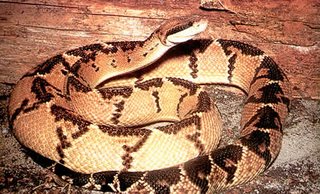Poisonous as Hell, part two:
 The Bushmaster Snake
The Bushmaster SnakeIn the words of the great interactional theorist Ricki Lake, you think you all that. You have a BA from Harvard, an MA from Princeton, and a PhD. from Yale. Your hobby is investment banking, but your true passion is transcribing the oral tradition of the nomadic Berbers of the Rif Mountains. You own lofts in Paris, Manhattan, Kuala Lumpur and you’ve just negotiated yourself a good price on a pied a terre in Cleveland. You’ve published three volumes of romantic poetry and your screenplay is currently one of the hottest properties in Hollywood. You feel good about yourself, but no one who knows you would ever dream of calling you an egotist. They’d point to the seven hours a day you put in doing charitable work and they’d mention your groundbreaking research into natural water purification methods. Your selflessness, your compassion, and your self-deprecating sense of humor charm all those who meet you, even those who might otherwise be jealous of your wealth and good looks or dismissive or your diverse intellectual achievements. It would not be a stretch to say that everyone loves you.
Everyone, that is, except for the bushmaster snake of southern Guyana. In this creature, you have met your match. It completes Ms. Lake’s groundbreaking formula by reminding you that, in the end, while you may think that you all that, you actually ain’t all that. In other words, it is the nemesis to your hubris. The largest venomous snake found in the Western Hemisphere, the Bushmaster is a serpent which meets your achievements with silence, your generosity with defensive coiling, and your cultivation with sharp, poison-dripping fangs.
Perhaps it was foolhardy of you to venture into that untamed wilderness in search of a root which might one day be used to treat dengue fever. Perhaps you should have heeded local advice and stayed clear of the area known in the Guyanese argot as “The Place of the Really Mean Snake”. But a sense of adventure gripped you, didn’t it? A voice in your head told you that only risk-takers reap rewards in our modern world, that you’ve never settled for the safe in your life and you aren’t about to start now. Looking back on it, that was sort of a mistake, wasn’t it? Because it put you on a collision course with the rarely seen, reclusive bushmaster. It never would have found you in Monaco, Geneva, Aspen or Branson, Missouri, but you—in your damnable arrogance—had to go stomping right up to it in the heart of its inhospitable territory. Nice work, Dr. Dumbass.
Now, while the bushmaster is far from an intellectual, it would be wrong to say that it is a mindless, instinct-driven snake like the anaconda or the reticulated python. In fact, the Latin name of the bushmaster gives us hints as to it’s mental pursuits: Lachesis muta, meaning “mute fate”. This simple statement of purpose reminds us that, as we go willy-nilly through our lives, the future is always looming above, silent and judging. Despite all the scientific and artistic advances humans have accomplished, all the efforts we have put towards ordering our societies and our lives, fate lies in wait for us all, unmaking what we make, dismantling what we build, and wiping our fingerprints forever from the sheer, slippery hourglass that is our universe. More practically, “mute fate” also refers to the fact that pretty much everyone the bushmaster bites winds up dying. And dying in a way that perhaps can best be described as “hellish”.
Certainly, in the course of your studies, you have been appraised of the varying toxins and poisons that snakes can inject into your body. Even as you writhe on that South American forest floor, you understand that the bushmaster is of the viperid family, which (unlike the gentler elapids with their predilection for subtle neurotoxins) tend to use proteolytic venoms. These chemicals, you probably recall, not only immobilize you, but also begin the digestive process before the snake even starts to eat you. Now, since you’re not a small woodland creature or a bird, the bushmaster will not devour you, but it’s poison doesn’t know that as it goes circulating through your bloodstream and tissues, melting whatever it comes across, causing massive internal bleeding and rapid, catastrophic organ failure.
It’s really a pity. You’ll never hear the sound of Horowitz’s piano again, you’ll never experience the grandeur of a Rothko canvas again, you’ll never taste the salt air of the Mediterranean again. You had a good run, it is true, but the misery of your passing blots so much of it out. There, where the tree cover is so thick the sun comes down only in narrow streaks, you cannot remember the joy of discovery that once motivated you, nor can you recall your many happy friendships and love affairs. You think nothing of your many diverse accomplishments. You think only of the burning agony of your body being corroded from the inside out. As your heartless killer slithers away, your incredible mind becomes capable of only one thing: screaming.
Scream away, why don’t you? It won’t do any good, but it can’t hurt. It’ll give you something to while away the time before your heart forgets to beat and your lungs forget to billow and all your great potential comes crashing into the darkness that waits for all of us. Now your gym-toned body will bloat in the sun and then ooze away into a brackish, skin-colored puddle. Your corpse will grow moss and suckle insects. As the years go by, you’ll be remembered fondly by everyone, by the mighty and the lowly, by baronesses and by the tiny, shrew-like creatures that now use your naked ribcage as shelter during the rainy season.

